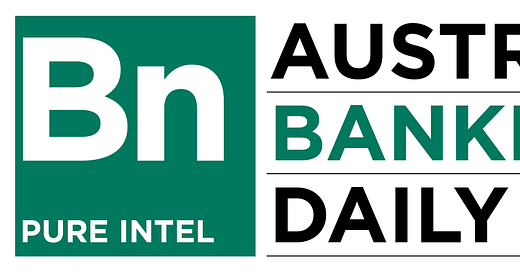Day 321: A permanent hit to profits
An introductory weekday newsletter from Schwartz Media. Counting the days since the banking royal commission was established.

Good afternoon and welcome to day 321.
Today in summary: Reserve Bank Assistant Governor Michele Bullock says banks will take a permanent hit to profits as they’re forced to change their business models; the small business ombudsman wants the Banking Code of Conduct updated before it’s turned into law; and the US prepares to usher in new standards on the way large banks are regulated, winding back some of the measures put in place after the global financial crisis.
-- Charis
Current banker panic level: 😨😨😨
Please don’t keep Australian Banking Daily to yourself. Forward this email to your colleagues and encourage them to sign up for free here.
The direct financial impact of the royal commission has been “modest” to date, says Reserve Bank Assistant Governor Michele Bullock, but will likely turn into a more permanent hit as banks change their business models. And that’s on top of remediation costs, the possibility of class actions, and increased costs of compliance. The comments come as analysts warn of the worst bank earnings season in a decade.
Small business ombudsman Kate Carnell says the Banking Code of Practice should be reviewed by ASIC again, given Commissioner Hayne has recommended it be codified as law. Carnell’s submission to Commissioner Hayne’s interim report says the code falls short of addressing the imbalance of power held by the banks, and “will allow the continuation of the aggressive bank tactics revealed by the commission”. The ombudsman says there are still too many escape clauses that allow banks to call in loans with no notice.
The US Federal Reserve is expected to vote this week on new standards governing the way America’s largest banks are regulated. The Fed has flagged the potential for less stringent liquidity requirements for banks with more than US$250 billion in assets. The wind back of some regulation put in place after the financial crisis would see banks divided into categories based on risk factors including size, international activity, off-balance sheet exposures and levels of short-term funding. It will implement the regulatory relief bill (also known as the Crapo bill) signed by President Trump in May.
Today’s burn prize: ‘Diligent bankers’
🔥🔥🔥
“Clause 49 asks us to rely on ‘diligent and prudent’ bankers. The Commission has proven that we cannot.”
Small business ombudsman Kate Carnell finds large holes in the Banking Code of Conduct that could soon become the standard by which all bankers are legally held to account.
The Commentariat
Commissioner Hayne should turn his focus to the role of bank auditors, writes La Trobe Business School Professor Stuart Kells.
“Our financial regulators were one set of observers, and they've rightly drawn criticism for their lethargy and softness. But another set of observers, the auditors, has received little attention so far.”
Jamie Dimon, who is both the CEO and chairman of JPMorgan’s board, has been showing an increasing but problematic desire not to have to answer to shareholders, writes Bloomberg’s Stephen Gandel. He says while Dimon has undoubtedly been a great leader for the bank, there are signs he’s willing to withhold important information from shareholders.
“In the wake of the financial crisis, investors agreed that bank CEOs should have more checks on their power. Both Bank of America Corp. and Citigroup Inc. split the chairman and CEO roles. Now things are going in the opposite direction.”
For the reading list
Most banks will be made irrelevant by 2030 - Gartner
The research firm predicts Australia will use regulation to hasten the digital transformation in financial services.
IMF Chart of the Week: Financial Reform Report Card
A more granular look at the progress (or lack of it) on banking sector regulation and supervision since the global financial crisis.
This is an introductory service while we’re building a comprehensive daily paid online publication, coming in early 2019.
We’re not here to offer opinion, simply to cut through the noise, and help you make sense of the emerging policy and market trends you need to be across. We call it pure intel. You can read more about us here.


